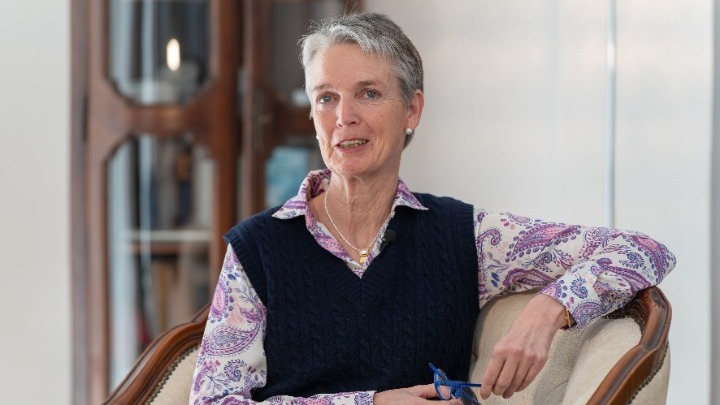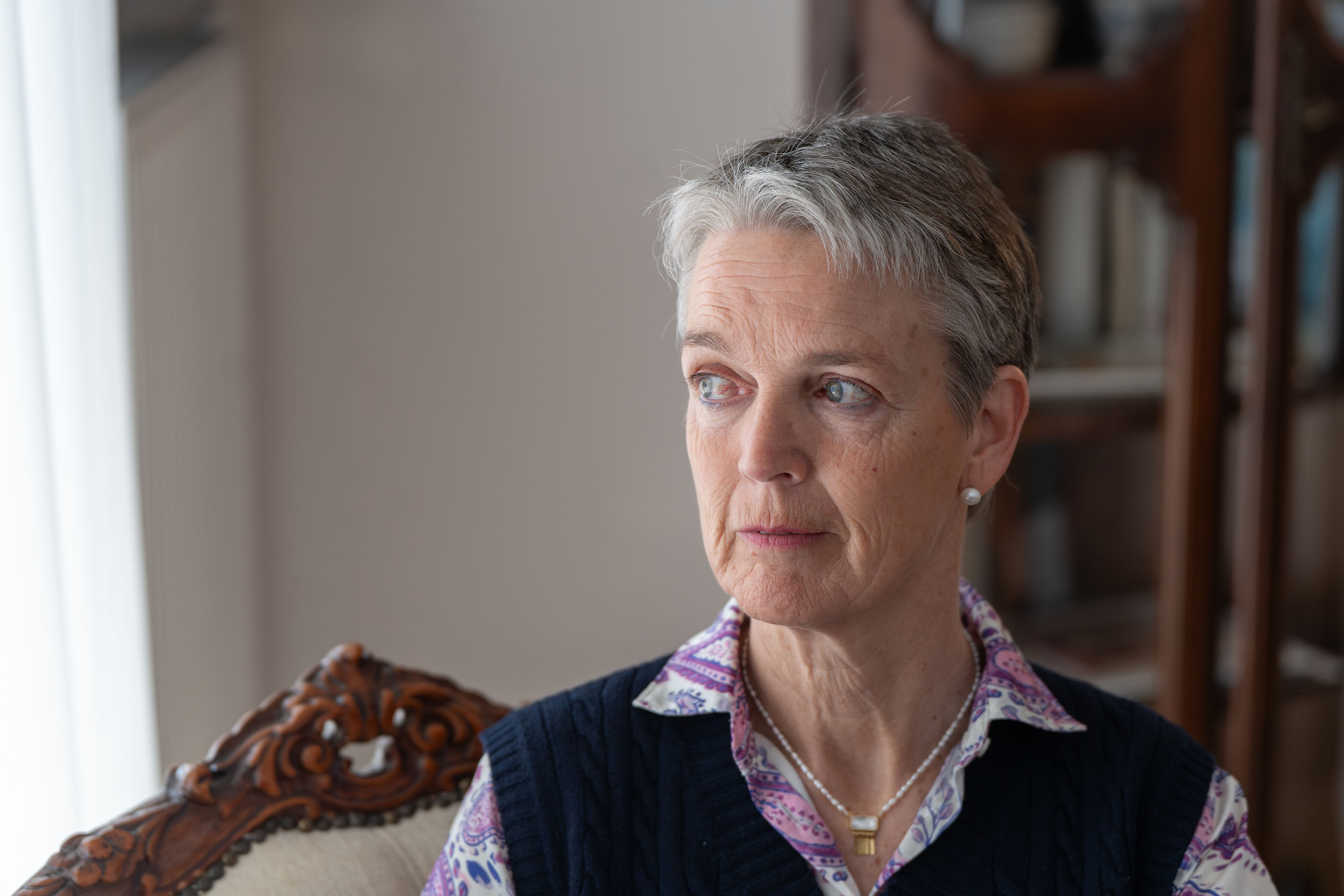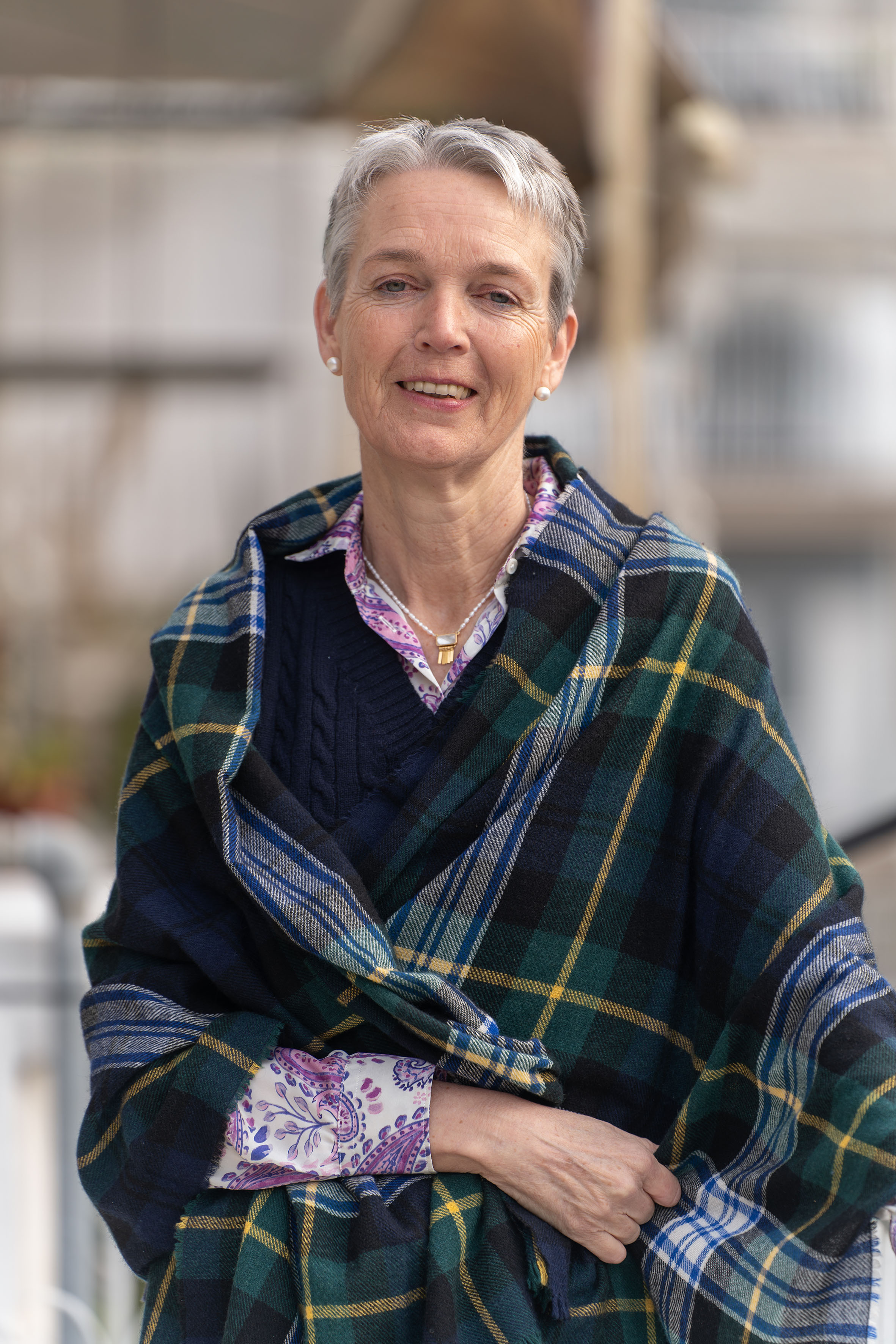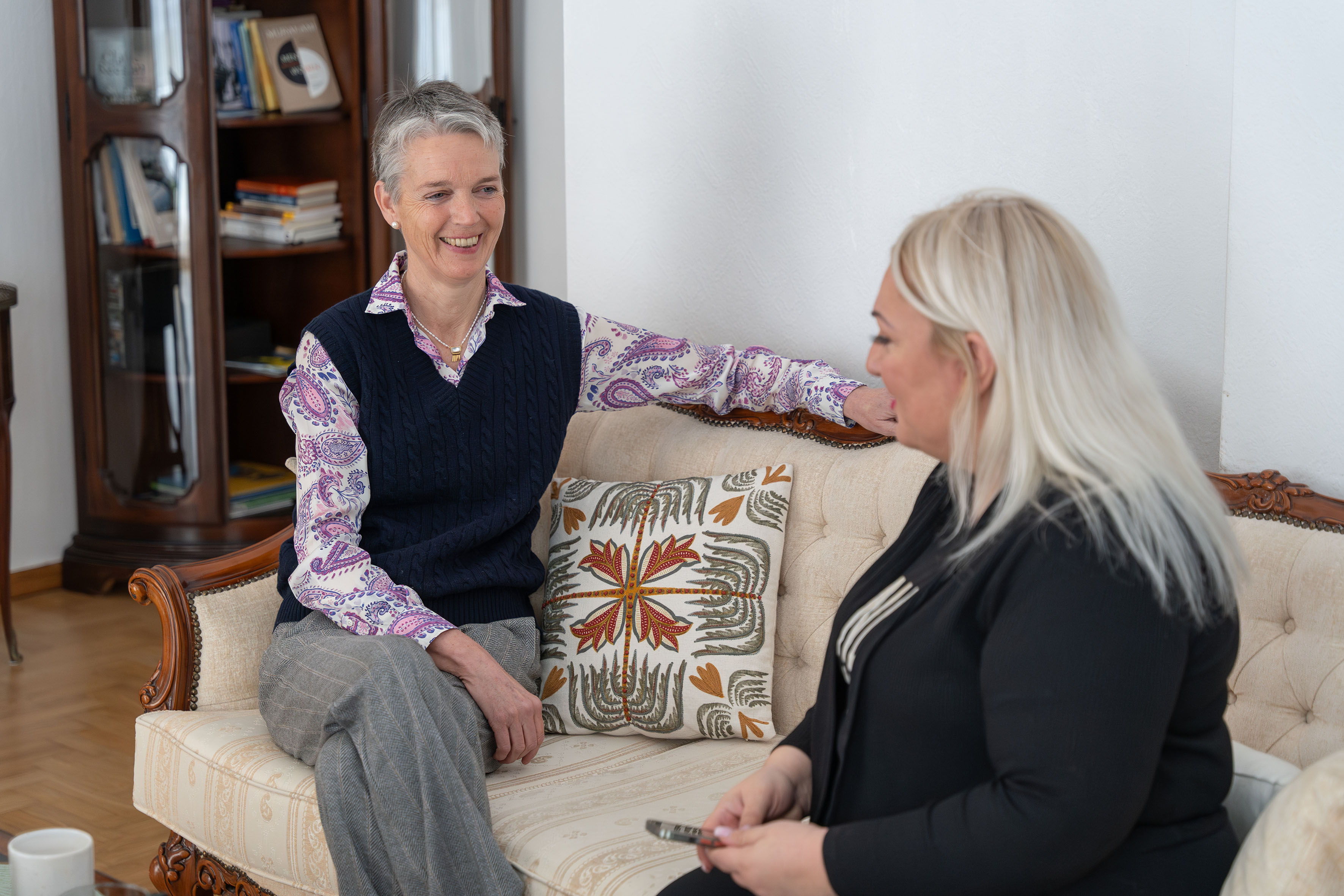INTERVIEW Monika Frank to ANA-MPΑ: Northern Greece is ideal for investments

Northern Greece is ideal for investments that will help diversify the European economy and free it from dependencies on third countries, the German Consul General in Thessaloniki, Monika Frank, said in an interview with the Athens-Macedonian News Agency (ANA-MPA).
"I think this is the perfect time and the perfect place to diversify Central European, Western European economics by cooperating, especially with Greece and Northern Greece," Frank told ANA-MPA.
In her first interview since taking office, the German Consul General spoke about the prospects of the region, which has many advantages but it also needs investments in some infrastructure, while also referring to the major project of the construction of the Holocaust Museum, which will be built with funding from the Federal Republic of Germany. "It’s going to put Thessaloniki and Greece back on the landscape of memory."
Germany’s positive impact at TIF
Frank arrived in Thessaloniki last August, a few weeks before the Thessaloniki International Fair, where Germany was the honored country, and this "jump in the middle of events" that she had to do "was wonderful," as it gave her the opportunity to learn about many topics and come into contact with many people. "That was the biggest foreign fair participation of Germany since 25 years, and that happened here in Thessaloniki," she said adding that "our hall, was really appreciated because it was something special. It was specifically designed for the fair, and I think this different approach, this concept, architecturally speaking, was an event, something new for the city and the region to see."
"The economic effect, that's something which you can't really measure in exact statistics, but according to our Chamber of Commerce, which we are lucky to have here, there were as many as 360 B2B talks specifically taking place there. Two B2G, that means business to government deals or MOUs, were signed. A lot more contacts, of course, did take place. So, politically speaking or in a wider context, I think it took Germany back into the public consciousness here in Greece and in Thessaloniki, not only as an economic partner, because that's well known, but I think the success of this event was to showcase the variety and diversity of B2G relations, because it was not only about enterprise, it was about scientific institutions, it was about cultural organizations, about a lot of NGOs, a lot of things, and this was something I think was really appreciated by the public," Frank stressed.
She added that it also "deepened channels of dialogue between the two countries" and it was a chance for German companies and institutions to explore potential and possibilities in Greece. "So it wasn't a one-sided approach, it's always two-sided."
Many areas for synergies - Pier 6 expansion an opportunity
Mapping the areas of cooperation, Frank pointed out that there is active cooperation in the fields of information and communications technology (e.g. T-Digital), services and business process outsourcing (mainly call centers), energy and renewable resources, where there is a company called Juwi. Active cooperation also exists in logistics and transport with Fraport and DHL, in companies involved in waste management and recycling (Econ Industries), in real estate, tourism and in the field of medicinal cannabis.
In addition to the above sectors, there are others that, according to her, offer themselves for further development of bilateral cooperation.
"There is active interest from the Greek side for everything that concerns contract manufacturing, because northern Greece provides very good cost competitive conditions in these fields, like metal processing, mechanical engineering and electrical equipment. And further areas for strength and cooperation are AI, digitalization, all kinds of green tech technology and innovation, like for example Thess-TECH and the nanotechnology lab. There are German companies involved, German scientific institutions as well. And then of course logistics and transport, and this is not only the airport but also with the further development of the port, there are big opportunities because with the enlargement and the upgrading of pier 6 at the port, you need the hinterland connection. And this is something which could be a field of cooperation in the field of logistics and transport as well."
Interest from Greek companies for investments
Is there a corresponding interest on behalf of the Greek companies to invest in different sectors of the German economy? "Yes, there is an interest concerning energy and innovation, like from the side of nanotechnology, also all kinds of agro-business and food, textile processing and digital marketing. That's according to our Chamber of Commerce which we are lucky to have here."
She added that she had talks with both the chambers of crafts and the professional chamber in Thessaloniki, and both "are deeply interested to either revive or newly establish contacts and cooperation" with their counterparts in Germany. "So that's something that we are actually working on. And this would be a wider approach. This is not only business to business, but it's a systematic approach."
"Nearshoring is key - Northern Greece is ideal for this"
"We have seen in the pandemic, but even before, we have too many dependencies from outside Europe, and we need to diversify. And the key word here is nearshoring. And I think, especially Northern Greece is perfect for a concept of economic nearshoring, and useful for both sides.
"It's about investing here and having a profit for both sides, creating labour workplaces and creating perspectives, job perspectives here for the people, because this is one of the problems I see is the high unemployment rate, especially among youth. And this makes it also vulnerable for political shifts to the extreme. So this is something that we have to take care of, I think."
Northern Greece is ideal for sustainable tourism - Infrastructure needed
The beaches of Halkidiki may be flooded every summer (and) by German tourists, but Frank stated with certainty that her compatriots are also interested in other forms of sustainable tourism and Northern Greece is “ ideal” for something like that. "German tourists don't only want to sit on the beach, but I think they like hiking, they like sustainable tourism, they like off-season tourism," Frank underlined stressing that what is needed is some investments in infrastructure.
"Just one example. One of the last weekends, I went to Agia Triada, which is just across the bay. And from there you can see Thessaloniki, which is beautiful. In the evening you see the lights. There is a beach where you can walk. And there is also a pier, so you could take a small boat to cross over in 40 minutes, which would be perfect. But there are no facilities. I mean, the only thing you would need is, of course, a hotel that would be open during the winter season. But you would also need a little investment to build just a wooden plankway along the long, long beach to perhaps make a bike path or also something that is accessible for wheelchairs. And then you just would have to clean up a little bit. And I think this is something that makes me sad when I see it, because the landscape here is so beautiful, but a lot of places are spoiled by just dumping waste."
"That kind of tourism would benefit both sides. It would be for elderly people like 'silver age' tourism. It's not only about foreigners coming here, but also for the people who live here who would have access to their beaches with wheelchairs, with elderly people and enjoying their own landscape. I think there is a huge potential. And I also think there is a huge potential for all kinds of medical and rehabilitation tourism."
"The Holocaust Museum is a very important project"
"I think the museum is a very important project, and it's highly overdue. And it's going to take, to put Thessaloniki and Greece back on the landscape of memory. Because this history is not known. It's not known in Germany. It's known to people who have descended from Thessaloniki, but in a wider context, it's not known. So this is something which is really important. Also, what I think is important, it gives back, the museum is a chance to give back a face and a voice to the people and the individual lives that suffered the Holocaust. I think, that we talk very often about numbers [...] It's important to get into the stories, into the individual stories, because all of these people, children, women, men, old people, babies, they all had a name. They all had a birth name. They had a name, and they had faces, and they had their own individual biography. And it's a question of giving back a face and a name and a dignity to these victims. This is extremely important."
She also talked about the trauma that is passed down from generation to generation, something she herself realizes when meeting people who have lived the stories or are somehow part of this history. "And all the more, as I'm meeting people, there's still some people here that have lived the stories. I meet their children, I meet their families, and I realize how much the trauma is inherited and forwarded from generation to generation. That is something that I didn't realize really before [...] So we have to realize that the building of a museum does not finish the story [...] We have to follow up on this, and especially now, because it cannot only be a museum to the past. We have to make it a living place of dialogue, of education, because we are living a lot of dangerous things again. So we urgently need to reflect about how this museum can be created to be a living place of education, and where people are willing to go. This is the challenge."
She expressed her admiration for the architectural design of the Museum - "I love the concept of this octagonal tower in the West, which reflects the White Tower" she said - but also her great joy for the fact that Ruth Uhr has taken over as chief curator. As for the role of Germany in the future of the Museum, she points out that there is an ongoing discussion on this issue. "First of all, it is now about the actual start of construction. At the same time, an intensive discussion is taking place on the conceptual design. Germany is continuously involved here."
Thessaloniki is different - its people are very warm
Having lived and worked in Athens in the past, from 2016 to 2020, her first impression when she came to Thessaloniki was that it was a different city. "Thessaloniki is really different. It's totally different from the whole culture, from the historical background, from the climate” she said. “ I was really impressed by the friendliness and warmth with which I was received. I meet people every day who speak German and who talk to me about their experience with Germany, and I'm grateful that they are all positive."
She referred to her "wonderful team" at the consulate, which includes many Greeks who were born and raised in Germany as well as Germans who live here. All of them, she said, are part of both her professional and personal life. She also noted that she lived in Athens as a child, as her father worked for a Greek company here, so she is a "Gastarbeiter child", but in the opposite direction. All of this is part of her professional and personal life.
Interview: Sofia Papadopoulou
Photo: Nikos Arvanitidis




